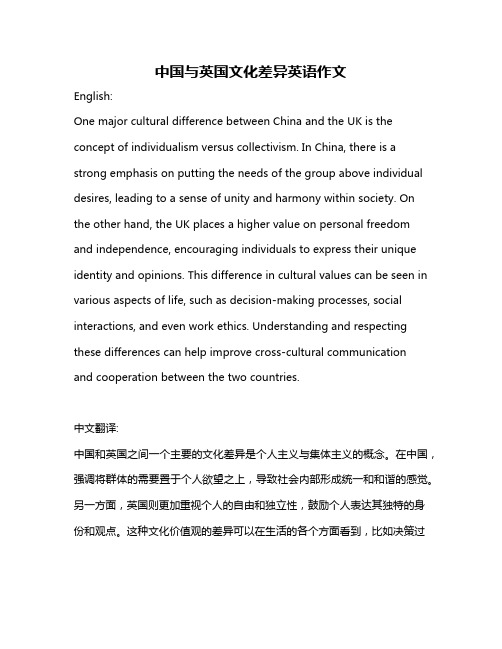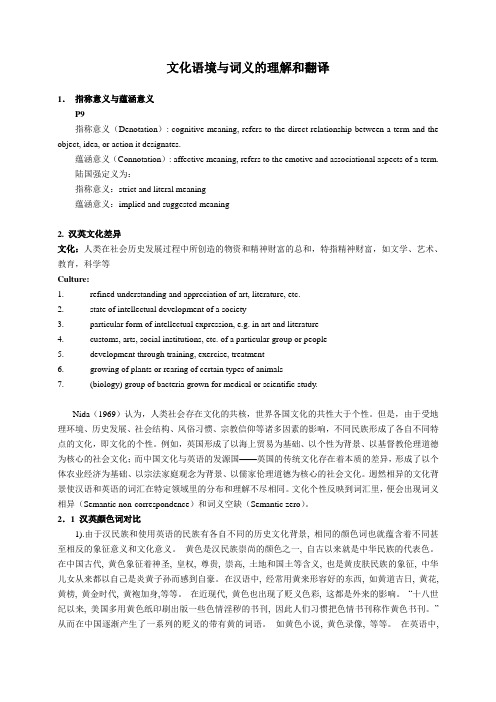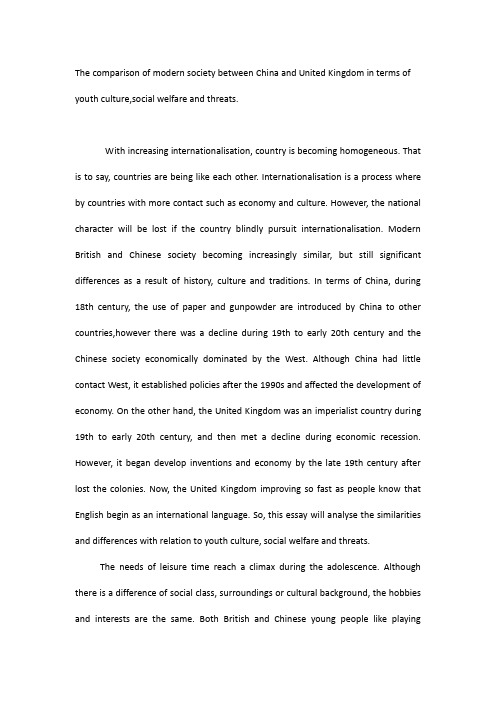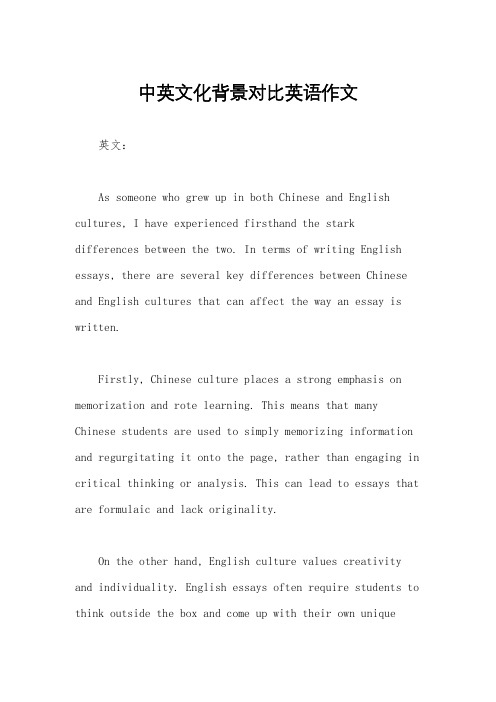英国文化与中国文化对比英文
中国与英国文化差异英语作文

中国与英国文化差异英语作文English:One major cultural difference between China and the UK is the concept of individualism versus collectivism. In China, there is a strong emphasis on putting the needs of the group above individual desires, leading to a sense of unity and harmony within society. On the other hand, the UK places a higher value on personal freedom and independence, encouraging individuals to express their unique identity and opinions. This difference in cultural values can be seen in various aspects of life, such as decision-making processes, social interactions, and even work ethics. Understanding and respecting these differences can help improve cross-cultural communicationand cooperation between the two countries.中文翻译:中国和英国之间一个主要的文化差异是个人主义与集体主义的概念。
在中国,强调将群体的需要置于个人欲望之上,导致社会内部形成统一和和谐的感觉。
另一方面,英国则更加重视个人的自由和独立性,鼓励个人表达其独特的身份和观点。
中英颜色词的文化差异及翻译

蓝色:在中国文化中代表天空、自由,而在英国文化中可能代表忧郁、悲伤。
红色:在中国文化中代表喜庆、吉祥,而在英国文化中可能代表危险、警告。
绿色:在中国文化中代表生机、活力,而在英国文化中可能代表嫉妒、不幸。
白色:在中国文化中代表纯洁、干净,而在英国文化中可能代表死亡、哀悼。
中英颜色词的翻译实践案例分析
中英颜色词的起源与文化背景
02
中国颜色词的起源与文化背景
红色:象征喜庆、吉祥、繁荣黑色:象征庄重、神秘、严肃白色:象征纯洁、干净、和平绿色:象征生命、希望、和平黄色:象征尊贵、权力、财富蓝色:象征天空、海洋、自由紫色:象征高贵、神秘、浪漫橙色:象征活力、热情、温暖灰色:象征沉稳、低调、内敛褐色:象征大地、自然、朴实
中英颜色词的文化差异及翻译
, a click to unlimited possibilities
汇报人:
单击此处添加目录项标题
中英颜色词的起源与文化背景
中英颜色词的文化内涵与象征意义
中英颜色词的翻译技巧与注意事项
中英颜色词的跨文化交际与翻译实践
中英颜色词的发展趋势与未来展望
目录
添加章节标题
01
01
红色:热情、活力、勇敢、爱情
04
02
03
蓝色:平静、稳定、忠诚、安全
绿色:自然、环保、和平、希望
黄色:阳光、快乐、温暖、智慧
05
黑色:神秘、权威、优雅、死亡
06
白色:纯洁、和平、干净、开始
中英颜色词的翻译技巧与注意事项
04
直译法
直译法的适用场景:源语言和目标语言在颜色词方面有相似之处,可以直接翻译
直译法的缺点:可能不符合目标语言的表达习惯,难以传达源语言的文化内涵
中英文化对比的英文作文

中英文化对比的英文作文英文:Culture is a fascinating topic to explore, especially when comparing different cultures. As someone who has experienced both Chinese and English culture, I find it interesting to compare and contrast the two.Firstly, one of the biggest differences between Chinese and English culture is the concept of individualism versus collectivism. In Chinese culture, there is a strong emphasis on the importance of the group and the family, whereas in English culture, individualism is highly valued. This can be seen in the way people interact with each other and in their attitudes towards personal achievement.For example, in Chinese culture, it is common for people to live with their parents until they get married and to take care of their elderly parents. This is because family is seen as the most important thing in life. Incontrast, in English culture, it is more common for people to move out of their parents' home at a young age and to focus on their own personal goals and achievements.Another difference between Chinese and English culture is the way people communicate. In Chinese culture, indirect communication is often used, where people may not directly say what they mean or may use nonverbal cues to conveytheir message. In English culture, direct communication is more common, where people tend to say exactly what they mean.For example, in Chinese culture, it is considered impolite to say "no" directly, so people may use phrases such as "maybe" or "I'll think about it" to decline an invitation. In contrast, in English culture, it is more common to simply say "no" if you are not able to attend.中文:文化是一个非常有趣的话题,尤其是在比较不同的文化时。
文化语境与词义的理解和翻译

文化语境与词义的理解和翻译1.指称意义与蕴涵意义P9指称意义(Denotation): cognitive meaning, refers to the direct relationship between a term and the object, idea, or action it designates.蕴涵意义(Connotation): affective meaning, refers to the emotive and associational aspects of a term.陆国强定义为:指称意义:strict and literal meaning蕴涵意义:implied and suggested meaning2. 汉英文化差异文化:人类在社会历史发展过程中所创造的物资和精神财富的总和,特指精神财富,如文学、艺术、教育,科学等Culture:1.refined understanding and appreciation of art, literature, etc.2.state of intellectual development of a society3.particular form of intellectual expression, e.g. in art and literature4.customs, arts, social institutions, etc. of a particular group or people5.development through training, exercise, treatment6.growing of plants or rearing of certain types of animals7.(biology) group of bacteria grown for medical or scientific study.Nida(1969)认为,人类社会存在文化的共核,世界各国文化的共性大于个性。
中英文化中的礼貌对比研究AContrastiveStudyofPolitenessinEnglish

面部表情:中国人在交谈中 更倾向于保持严肃的面部表 情,而英国人则更倾向于展
示自己的情感和反应
中英沉默的礼貌差异
中文语境中, 沉默可能表示 尊重、同意或 默认
英文语境中, 沉默可能表示 尴尬、不满或 拒绝
中文对话中, 适当的沉默可 以避免直接冲 突,保持和谐
英文对话中, 适当的沉默可 以表示思考、 倾听或尊重对 方观点
进餐礼仪:中式餐饮注重使用筷子 和勺子,而英式餐饮则更注重使用 刀叉和勺子
敬酒礼仪:中式餐饮中敬酒礼仪较 为复杂,而英式餐饮中敬酒礼仪则 较为简单
餐后礼仪:中式餐饮中餐后礼仪较 为随意,而英式餐饮中餐后礼仪则 较为正式
中英餐桌交谈的礼貌差异
中国餐桌交谈:注重家庭和睦,尊重 长辈,晚辈应主动为长辈服务
02
英文道歉:通常较为委婉,如 “I'm sorry”、“I apologize for any inconvenience”等
04
05 中英文化差异:中文更注重直 接表达情感,而英文更注重委 婉表达情感
跨文化交际:了解中英道谢与
06
道歉的礼貌差异有助于更好地
进行跨文化交际
中英委婉语的礼貌差异
中文委婉语: 常用成语、谚 语、典故等,
社交礼仪:中文 注重尊卑有序, 英语注重平等尊 重
餐桌礼仪:中文 注重集体主义, 英语注重个人主 义
礼物赠送:中文 注重心意,英语 注重价值
中英礼貌差异的原因
文化背景:中国注重集体主义,英国注重个人主义
历史传统:中国历史悠久,礼仪规范丰富;英国历史较短,礼仪规范相对简 单 社会环境:中国社会关系紧密,注重人情往来;英国社会关系相对松散,注 重个人空间
在中国,人们倾向于使用谦虚的方式表达赞美,而在英国,人们更倾向于直 接表达赞美。
中国社会与英国社会就文化,社会福利及威胁三方面的对比ENGLISH

The comparison of modern society between China and United Kingdom in terms of youth culture,social welfare and threats.With increasing internationalisation, country is becoming homogeneous. That is to say, countries are being like each other. Internationalisation is a process where by countries with more contact such as economy and culture. However, the national character will be lost if the country blindly pursuit internationalisation. Modern British and Chinese society becoming increasingly similar, but still significant differences as a result of history, culture and traditions. In terms of China, during 18th century, the use of paper and gunpowder are introduced by China to other countries,however there was a decline during 19th to early 20th century and the Chinese society economically dominated by the West. Although China had little contact West, it established policies after the 1990s and affected the development of economy. On the other hand, the United Kingdom was an imperialist country during 19th to early 20th century, and then met a decline during economic recession. However, it began develop inventions and economy by the late 19th century after lost the colonies. Now, the United Kingdom improving so fast as people know that English begin as an international language. So, this essay will analyse the similarities and differences with relation to youth culture, social welfare and threats.The needs of leisure time reach a climax during the adolescence. Although there is a difference of social class, surroundings or cultural background, the hobbies and interests are the same. Both British and Chinese young people like playingcomputer games, doing sports. Generally, the Chinese young like playing basketball or table tennis while the British young more like playing football or rugby. In addition, there are several transformations in lifestyle, body-building, traveling et cetera are welcomed by the young. In about eighteen years of age, in the UK, more and more young people will be seen in the bar or disco, while Chinese youngsters like visiting each other at home or eating outside together such as cafe or restaurant. At the same time, social circle could be expanded through singing, dancing and making friends. But bad behaviors such as drinking alcohol or smoking could be picked up during this period. ' call to raise drinking age to 21' (bbc news,2007) said that the UK is one of the most serious place in Europe, a fifth of the children between 11-15 year old age will drinking at least once a week. However, David Poley (bbc news,2007), a chief executive of the Portman Group appealed that the government should make a real change in the alteration of drinking culture through education not the change in drinking taboo. Similarly, the Chinese young face the same situation toward drinking alcohol. Therefore, as can be seen that modern British and Chinese youth culture are assimilated by each other.Although there are several similarities between British and Chinese adolescence, differences are existed among the youth culture. In terms of the attitude to drugs, according to the British Crime Survey 2005/2006 (Drugscope,2006) claimed that the age of drug use is 20-24 year old age groups, which means more and more people try to use drug because of curiosity or other reasons in a young age. While in China, the age of drug use is about 35 year old age (xinhuanet,2009). Thissignifies that the user must have a certain social status or payment capacity of drugs, otherwise they cannot afford the expensive price. This is different with British drug addict.The second difference between British and Chinese youngster is the relationship with adults such as teachers and parents. In United Kingdom, with the age gradually increase, young people became independent in mind, to consider issues like adults. In school, teacher will respect the idea of the youngster so that they have pioneering thinking. At home, in the same way, parents respect the thought of children, and then youngster can learn to undertake the responsibility of the behavior. Therefore, the British young people could make own decisions and become independent. On the contrary, in China, although children have already grown up and became mature, even could control the behaviors, teachers and parents still hope that young people can fulfill the expectations of schools' and family's. For overprotectionism, the thoughts and actions of children are always restricted because of the enough life experience which parents have, and then it not only leads to a greatly reduction of youth's creativity and imagination, but also to a part of the young, childhood were spent in the supervision of parents' that was an agonizing flashback.The third difference is an attitude with regard to sexuality between Britain and China. Sexual protection measures are often overlooked by the young who never considered the consequences. For adolescence, sexuality needs time to understand, just like doing experiment. Young people think they are strong-willed, and will not bebullied. However, when these people are genuinely having a difficult time, and then will tend to seek partners and have sex. Therefore, the proportion of pregnancies among young people gradually increased. However, the attitude toward sexuality, the British young are more open than the Chinese young, after all China used to be a relatively conservative country. Chinese people are traditional and taboo. Therefore, the Chinese young are more politically conservative, this could protect the young far way from sexuality in a youthful age. Even today, most Chinese people adore the virgin. Therefore, in terms of sexuality, there is a big difference between Britain and China.In conclusion, although leisure time is similar between the British and Chinese young, youth culture in modern Britain have more differences with Chinese society with regard to the attitude to drugs and sexuality, also the relationship with adults.As well as youth culture, social welfare is another aspect of society where similarities and differences can be seen between British and Chinese society. Social welfare is a measure which provides assistance to community members and improves their quality of life. Both British and Chinese social welfare system have been constantly adjusted and modified, which already reached a certain scale and level at present. In addition, social welfare assist disabled people in education and employment. The most important is that both the two countries make a significant contribution in national insurance, national health services, personal social welfare, housing and education. In this way, the stability of social order is ensured, public good and cultural levels are improved, even the gap between the urban area and therural area is reduced gradually, and those effectively performances are all thanks to the exerting of concrete measures.However, there are still several differences exist in the specific measures between the British and Chinese society. Unemployment benefit, for instance, in the United Kingdom, Jobseeker's Allowance (JSA) introduced that a person who over 25 year old age is paid £ 65.45 per week in maximum at 29.June,2009; the person who aged 18-24 is paid £ 51.85. A maximum of £ 102.75 per week is paid to the couples who are both unemployed. However, it depends on age, circumstances and other factors. JSA could provide assistance to the people who in Britain actively seek work or working less than 16 hours per week on average; or aged 18 or over ,but below State Pension age. While in China, the unemployed can be gained assistant by China's Unemployment Insurance System, then standard of Unemployment insurance payment is according to the principle of below the local minimum wage standards and higher than the urban minimum living standard level, specific decision is made by provincial governments, there is no uniform standards. Therefore, we can know that there are different policies between Britain and China in social welfare.In a different way, social welfare for the disabled also reflect difference between British and Chinese society. Due to eastern countries are earlier than Western countries in establishment of social welfare and security systems, the British social security system is more consummate than China's. So there are some measures which are worth to study for eastern countries. The benefit for the disabled in England (Adviceguide), for instance, Employment and Support Allowance(ESA), Disability Living Allowance (DLA), Attendance Allowance (AA) et cetera are all provide assistance to the disabled in England. While in China, although the government in the enforcement of disabled social security system is in accordance with national law enforcement, in different provinces and cities are still have different policies. Security system for people with disabilities is not perfect so far, which means the government in China have to improve policies and provide more assistant to the disabled. This is a difference compare with Britain.As can be seen from social welfare, British society is more perfect than Chinese society in terms of unemployment benefit, disabled policy and security systems. However, another aspect can be analysed is the threats to these two countries. Economy, for example, both Britain and China failed to escape the threat of the financial crisis during 2007 to 2008. It is a global problem which has influence on currency depreciation, business insolvency, increased unemployment, economic depression, sometimes even accompanied by social unrest. For Britain, unemployment rate increased by 0.5% to 5.7%. Large amounts of data showed that there is a falling in British house prices, car sales and industrial output, but a rising in inflation. Similarly, China has suffered a downturn in the crisis either. There is a decline in international trade, such as import and export, as well as high unemployment rate. But in overall, the influence compared to other European countries is not very serious. Beyond that, Both Britain and China are facing some issues on water shortage, natural disasters and environment pollution. Climate change and global warming, for example, Anup Shah (globalissues,2011) introducedthat as climates change and the global warming, species and habitats are being slowly reduced. The adaptability of natural ecosystems is declined as well. Therefore, every country should take actions to save the earth.Despite Britain and China have several similarities on threats, in terms of the living environment, differences are still can be found. For Britain, one of the most serious threats in life is endangered British birds. The Royal Society for the Protection of Birds (RSPB) spokesman Andre Farrar (bbc news, 2008) said that there are many kinds of birds of prey are being killed, such as golden eagles, hen harriers, goshawks, red kites, and peregrine falcons. The British Association for Shooting and Conservation (BASC) also denounced the action of persecution. In the United Kingdom, people who found killing the birds of prey would face a fine of up to 5000 pound. Thus, Mr. Farrar suggested that the change of culture and the reformation of the shooting industry would be a good solution way. While in China, one of the most serious threats in life is the sewage disposal. Many of the country's rivers are badly polluted as raw sewage often gets the basic treatment. In addition, compare to Britain, the tap water in China cannot be drunk directly because of the low level of sewage disposal. Since the implementation of sewage treatment in China is relatively late compared with other countries, it is necessary to study advanced technology from Western countries. So far, a part of sewage treatment technology has reached the international advanced level, but it is still needs to be improved. Therefore, the environmental pollution situation should be controlled in a timely manner.As can be seen this essay has already given a description of the similarities anddifferences between the British and Chinese society with regard to three aspects. Whether the youth culture, or social welfare, or the threat, both two countries need to analyse the advantages and disadvantages. While in moving toward internationalization, national character cannot be ignored. Through the comparison both British and China should promote the common prosperity, boost social harmony.Reference:Anup Shah. Global Issues: Climate Change and Global Warming; Climate Change and Global Warming Introduction. Globalissues. 14, April, 2011. Access: 19, April, 2011. /issue/178/climate-change-and-global-warming Benefits - In England; Employment and Support Allowance; Disability Living Allowance; Attendance Allowance; Disablement Benefit. Adviceguide. 17, April, 2011. Access: 18, April, 2011./index/life/benefits/benefits_for_people_who_are_si ck_or_disabled.htmBritish birds of prey ‘at risk’. BBC NEWS. 22, April, 2008. Access: 19, April, 2011. /1/hi/uk/7360720.stmCall to raise drinking age to 21. BBC NEWS. Sunday, 15, April, 2007. Access:17, April, 2011. /1/hi/6551887.stmCall to raise drinking age to 21. Crackdown. BBC NEWS. Sunday, 15, April, 2007. Access: 17, April, 2011. /1/hi/6551887.stmHendry, Leo B, Young people's leisure and lifestyle, London, Routledge, 1993. Access: 14-April-2011.How many people use drugs? Age of use. The national membership organization. October 2006. Access: 17, April, 2011./resources/faqs/faqpages/how-many-people-use-drug sLijun Peng. China on the dynamic control of drug users under the age of 35, the proportion of drug users continues to show a downward trend. 29, April, 2009. Access: 17,April, 2011./newscenter/2009-04/29/content_11283942.htm Sue Heath, Rachel Brooks, Elizabeth Cleaver and Eleanor Ireland, Researching Young People's Lives, London, SAGE Publications Ltd,2009. Access:14-April-2011.Unemployment benefits: United Kingdom: Jobseeker's Allowance rates: History and etymology. Wikipedia. 29. March. 2011. Access: 17, April, 2011./wiki/Unemployment_benefits。
中英文化背景对比英语作文

中英文化背景对比英语作文英文:As someone who grew up in both Chinese and English cultures, I have experienced firsthand the stark differences between the two. In terms of writing English essays, there are several key differences between Chinese and English cultures that can affect the way an essay is written.Firstly, Chinese culture places a strong emphasis on memorization and rote learning. This means that many Chinese students are used to simply memorizing information and regurgitating it onto the page, rather than engaging in critical thinking or analysis. This can lead to essays that are formulaic and lack originality.On the other hand, English culture values creativity and individuality. English essays often require students to think outside the box and come up with their own uniqueideas and arguments. This can be challenging for Chinese students who are used to following a set formula.Another key difference is the use of language. English essays often require a more conversational tone, with the use of idioms and colloquial language. This can bedifficult for Chinese students who are used to more formal and structured writing.Finally, cultural differences can also affect the way an essay is structured and organized. Chinese culture values hierarchy and structure, which can lead to essays that are very structured and follow a strict format. English culture, on the other hand, values creativity and flexibility, which can lead to essays that are more free-form and open-ended.中文:作为一个在中英两种文化中成长的人,我亲身体验了两种文化之间的鲜明差异。
英国文化及中国文化对比英文

英国文化及中国文化对比英文The cultural differences between the United Kingdom andChina are significant and reflect the unique historical, social, political, and economic backgrounds of these two nations. Inthis essay, we will explore some of the main aspects that distinguish British and Chinese culture.One of the most apparent differences between these two cultures is language. While English is the official language in the United Kingdom, China has Mandarin Chinese as its official language, spoken by the majority of its population. The written forms of these languages also vastly differ, with English using the Latin alphabet and Chinese using logographic characters.Another notable contrast lies in the cultural attitude towards individualism and collectivism. The British culture emphasizes individualism, valuing personal achievement and independence. On the other hand, Chinese culture is collectivist, prioritizing the needs of the group over the individual. Confucian principles, such as filial piety and respect for authority, greatly influence Chinese society.Food is a significant aspect of both cultures, albeit with distinct characteristics. British cuisine is often associatedwith traditional dishes such as fish and chips, roast beef, and English breakfast. Chinese cuisine, on the other hand, isdiverse and varies greatly across regions. It is known for itsemphasis on fresh ingredients, distinctive flavors, and cooking techniques such as stir-frying and steaming.Cultural celebrations also differ between the UK and China. Chinese New Year is a major event in the Chinese calendar, marked with family reunions, fireworks, and elaborate lion dances. The British celebrate holidays such as Christmas, Easter, and Guy Fawkes Night with traditions such as decoratingChristmas trees, exchanging gifts, and attending family gatherings.Religion plays a significant role in both cultures as well. Christianity is the dominant religion in the UK, with various denominations present throughout the country. In contrast, China is known for its religious diversity, including Buddhism, Taoism, Confucianism, and Christianity among others. Traditional Chinese beliefs also involve ancestor worship and spiritual practices such as feng shui.Another difference lies in the cultural attitude towards hierarchy and social etiquette. British society values politeness, punctuality, and formal manners. In China, hierarchical relationships and social harmony are highly regarded. Respect for elders and authority figures isparticularly emphasized, and proper social etiquette is crucial.These examples highlight just a few of the many differences between British and Chinese culture. It is important to note,however, that these cultural distinctions should not be seen as inherently superior or inferior to one another. Instead, they reflect unique traditions and values that have evolved over centuries. Understanding and appreciating these cultural differences can foster mutual respect and better international relations between the UK and China.。
- 1、下载文档前请自行甄别文档内容的完整性,平台不提供额外的编辑、内容补充、找答案等附加服务。
- 2、"仅部分预览"的文档,不可在线预览部分如存在完整性等问题,可反馈申请退款(可完整预览的文档不适用该条件!)。
- 3、如文档侵犯您的权益,请联系客服反馈,我们会尽快为您处理(人工客服工作时间:9:00-18:30)。
Western students enjoy a seemingly relaxed educational experience. This, however, is not the case for students in Asia, who face crushing workloads and are often very disciplined. In the first part of her Globalist.?The decision is partly based on an inability — or unwillingness —to spend thousands of dollars in tuition fees, especially given the suspicion that local schools are better anyway. After all, what more could one want from a basic education than a strong grounding in language, math and science, all subjects in which Asian schools famously excel. Our main concern is the ability of our son — and indeed the whole family —to adapt to the strict diligence that is expected of the Chinese. Apprehension increases when talking to local friends.?China has a long history of standardized tests, beginning with the ancient imperial exams initiated during the Sui Chen is at the top of the class at the Shanghai foreign language school, one of the city’s best middle schools. Already near fluent in English,she is studying German and ranks among the highest in her grade in physics. Her goal is to get a full scholarship to Harvard to study biochemistry. It is not only Western expatriates that grow anxious when hearing about students like Shelly.?Throughout England, politicians, parents and pundits worry that the industriousness and discipline of kids in the East are leaving relatively relaxed Westerners trailing behind. Though there is some debate surrounding the statistics, it is widely believed that North America is failing to produce sufficient graduates in sciences and less controversy attends the observation that math scores throughout the West rank well below those of most Asian countries. As a result, there is a deepening consensus that, in order to maintain its competitive edge,?Chinese students are taught that all questions have but one right answer and there is little room for American education needs to move away from an emphasis on fun, flexibility and individual learning , it has to shift towards a more strict, disciplined teachingenvironment that math and science, in particular, seem to shift can be discerned even in Canada, where there are no college entrance exams, and where, standardized testing, memorization and rote learning have long been frowned upon.?Nevertheless, there is a mounting chorus complaining that the prominence given to creativity cheats students out of a proper like science teacher Sumitra Rajagopalan are entreating Canadian educators to adopt a more Asian pedagogical p hilosophy based on “constant repetition, recitation, grilling and drilling”. In the United States, the rise of China and India is putting even more emphasis on the demand for education reform.?Tougher standards,New policies —such as No Child Left Behind —have led to an increased stress on standardized testing.?In the 2006 State of the Union address, President George W. Bush mentioned the threat of Asia’s giants specifically when introducing his “CompetitiveInitiative”, a program that promises substant ial funds for the teaching of basic math and science.?But in an ironic twist, there is an increasing desire to make education more England in China. Many now agree that the lack of creativity in China’s education system will soon prove a major stumbling block in the country’s continuing development.?Government and business leaders worry about a derivative, manufacturing-based economy, which is unable to innovate core technology, lacks major research and development projects —and lags far behind in creative sectors like marketing and design.?A lack of flexibility and inability of individuals to take the initiative affects the entire service sector, paralyzing employees at every level. Arriving late for the set breakfast at a five-star hotel in Chengdu, for example, I, along with a group of other foreigners, found that the coffee had run out. Our request for more threw the staff into was not until a series of meetings had been held and permission sought from seniormanagement that a fresh pot could be even trivial problems up the management hierarchy in this way is simply impossible in a sophisticated post-industrial society.?China has implemented a set of reforms known as “quality education”.This policy, which aims to teach creativity and emphasize character development, has resulted in certain concrete shifts including changes to textbooks, an increased emphasis on oral skills in language learning —and various attempts to get teachers to encourage student participation.?Most Chinese, however, are skeptical that anything other than surface transformation is taking place. As they are quick to point out, the underlying issue —an education system rooted in standardized tests —has yet to be altered.?Chinese students achieve near perfect scores on Western standardized exams. But when go abroad, they find themselves ill prepared for the education.?Today, national tests determine which elementary, highschool and university a student will attend. They are still the single most important factor in deciding one’s general career path.?The weight given to testing is regularly criticized throughout Chinese society. Newspapers and magazines commonly report on the extreme pressure of the general exams.?Stories range from concern over the suicide rate to bizarre anecdotes like the one about girls in Guangdong province who are said to have bought up mass quantities of contraceptive pills and then taken them during the test period —in the hope of warding off the ill effects of their menstrual these concerns, there is little real impetus for the testing system to change. In China, standardized tests are seen as the only way to guarantee meritocracy and ensure fairness. The Canadian method of granting university admission on the basis of interviews and grade point averages is seen as far too China, many believe that in a system like this the best schools, universities and jobs would go only to those with the right guanxii (connections). China’semphasis on memorization and rote learning has significant consequences. Students are taught that all questions have but one right answer and there is little room for debate and original thought.?Subjects like history and politics are focused solely on dates and names. Even the Chinese language exam, which requires students to write essays, allocates grades according to how well one can quote classical texts and idioms.?Passing trivial problems up the management hierarchy is simply impossible in a sophisticated post-industrial society.?As a result, Chinese students develop what appears to many Westerners as a shocking capacity for memorization. Many are able to recite entire articles and there are stories of some who are capable of committing the entire dictionary to memory.?Chinese students thus regularly achieve near-perfect scores on the standardized exams of Europe and England. when they go abroad many of these students find they are ill-prepared for Western education. Chinesestudents with phenomenal TOEFL (Test of English as a Foreign Language) scores are often incapable of taking part in simple English conversation.?At least one graduate school in one of England’s most elite universities has now become wary of accepting students from China for this skills such as in-class participation, seminar presentations and individual research projects, common practice in elementary schools in North America, are largely unheard of in the Chinese classroom — even in most universities.? National tests determine which school a student will attend. They are the most important factor in deciding one’s career path.?Moreover, the stress on original thinking and strict rules regarding plagiarism often seem baffling to students from China. An American teacher working in Yunnan province tells of encountering this cultural divide when two students handed in the exact same essay for an in-class exam.Because of diffrent traditions and cultures,there are many diffrences between Chinese education and British education.Firstly,the Chinese education is "nine year compulsory education".Most of schools are public the tutions come from the the British education is also compulsory the school system is two-track system which included the public school and the private the tutions are free in the public school while those come from the students' parents in the private school.Secondly,the Chinese schools only have some subjects,such asChinese,maths,English,history,physics and so Chinese students must study these subjects every they must work hard that they hardly have spare in Britain,the students have chances to choose an elective cource to expand their knowledge and they have much more spare time to play than Chinese students.Finally, the Chinese educational system is very of students have to pass the college entrance then theycan go to college to study a in Britain, the students have many choices to are many technology body can enter without certisfication and limeted age.Although there are many differences between the Chinese educantion and the British education,they have some adventages and disadventages in some aspects.。
